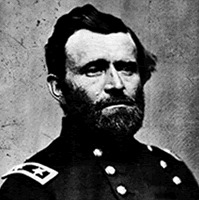
|
|
VITAL STATISTICS
|
BORN: 1822 in Point Pleasant, OH.
DIED: 1885 in Mt. McGregor, NY.
CAMPAIGNS: Forts Henry and Donelson, Pittsburgh Landing, Shiloh Church, Vicksburg, Chattanooga, Lookout Mountain, Missionary Ridge, and Wilderness to Appomattox.
HIGHEST RANK ACHIEVED: General-In-Chief (3-Star).
|
|
BIOGRAPHY
|
Ulysses S. Grant was born in Point Pleasant, Ohio. While Grant was still an infant, his family moved Eastwood to Georgetown, Ohio. Grant was an avid horseman from a young age. He undertook all the tasks in the house that related to horses, while avoiding working in his father's tannery.
Grant received a basic education at the local schools. In 1838, unbeknownst to Ulysses, his father arranged his acceptance to West Point. At West Point, he was only an average student. He graduated 21st in a class of 39 students in 1843.
Grant participated in the Mexican War as a lieutenant, later writing that he had thought the war immoral. Grant's military career continued uneventfully and without distinction until he resigned from the army in 1854 with the rank of captain.
With the outbreak of the Civil War, he asked to be recommissioned in the regular army but received no reply. Eventually, he was appointed Colonel in the Twenty-First Illinois Infantry. In August he was promoted to Brigadier General. In February, 1862, he captured Fort Donelson, Tennessee, in the first major Union victory. At this battle, he uttered his famous words "No terms except an unconditional surrender can be accepted."
Grant was promoted to Major General. He successfully laid siege to Vicksburg, cutting the Confederacy in half. After further victories, he became commander of all Union troops, whom he led to ultimate victory over the Confederacy. After the war, Grant was promoted to the rank of General of the Army, the first commander since Washington to hold this rank.
Grant was elected to the Presidency in 1868. He entered office determined to bring peace to a country that had endured the Civil War and the subsequent turmoil of Reconstruction. His lack of knowledge of politics and administration hampered his efforts, and caused his administration to become mired in scandal. Among the scandals were the attempt by Jay Gould and James Fisk to corner the gold market; the Credit Mobilier scandal where officers skimmed huge profits off of the federally subsidized construction of the Union and Pacific railroad; a whiskey ring scandal in which millions of dollars of federal money were diverted into private pockets; and, finally, there was the Belknap bribery case, which revealed that the Secretary of War had been receiving kickbacks.
Grant continued the policy of reconstruction that included the Federal occupation of much of the South. During his second term, the US economy fell into a depression lasting five years. For his financial and political loss of control, Grant is considered by many historians to be among the least successful American Presidents. |
|

